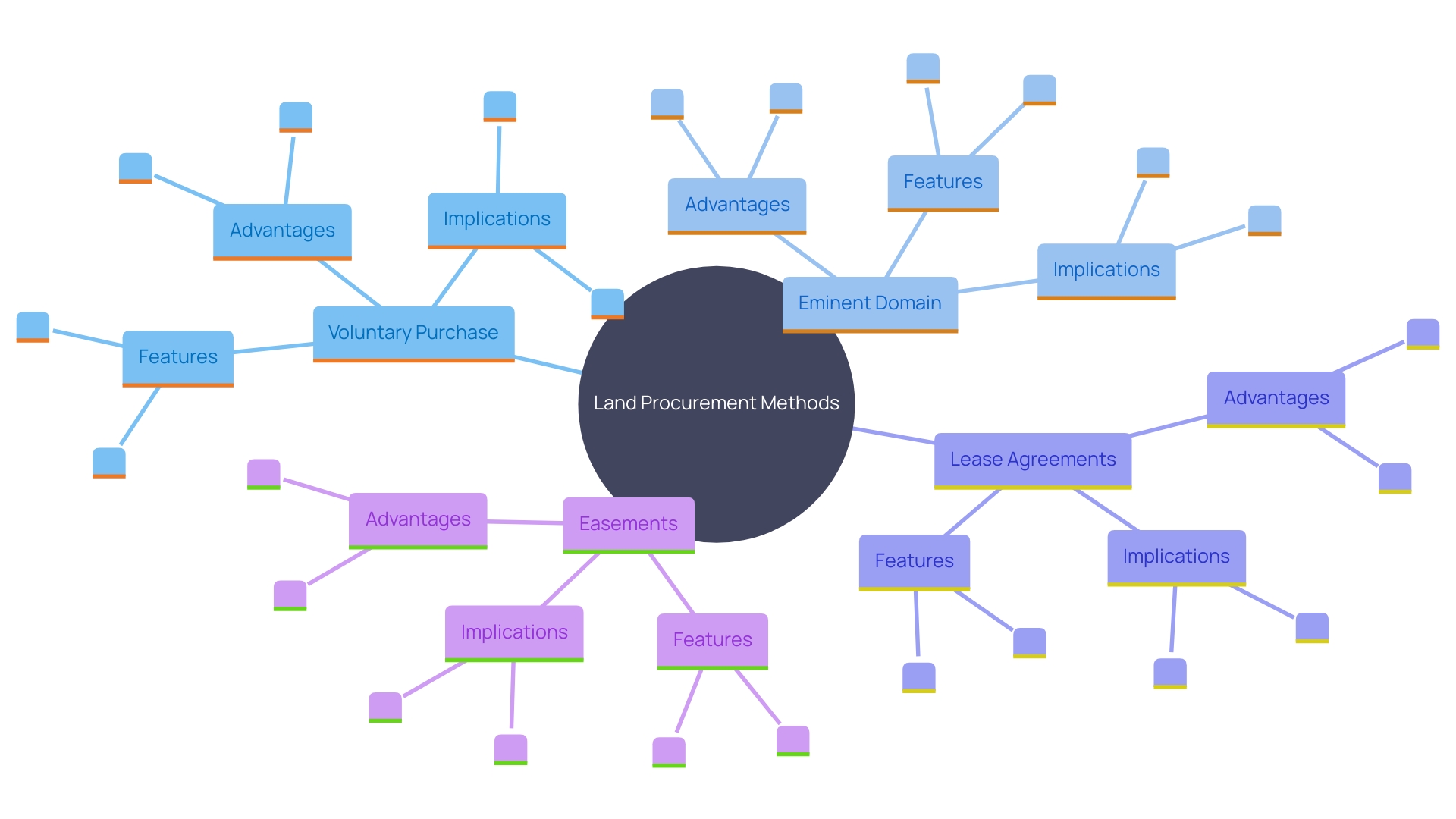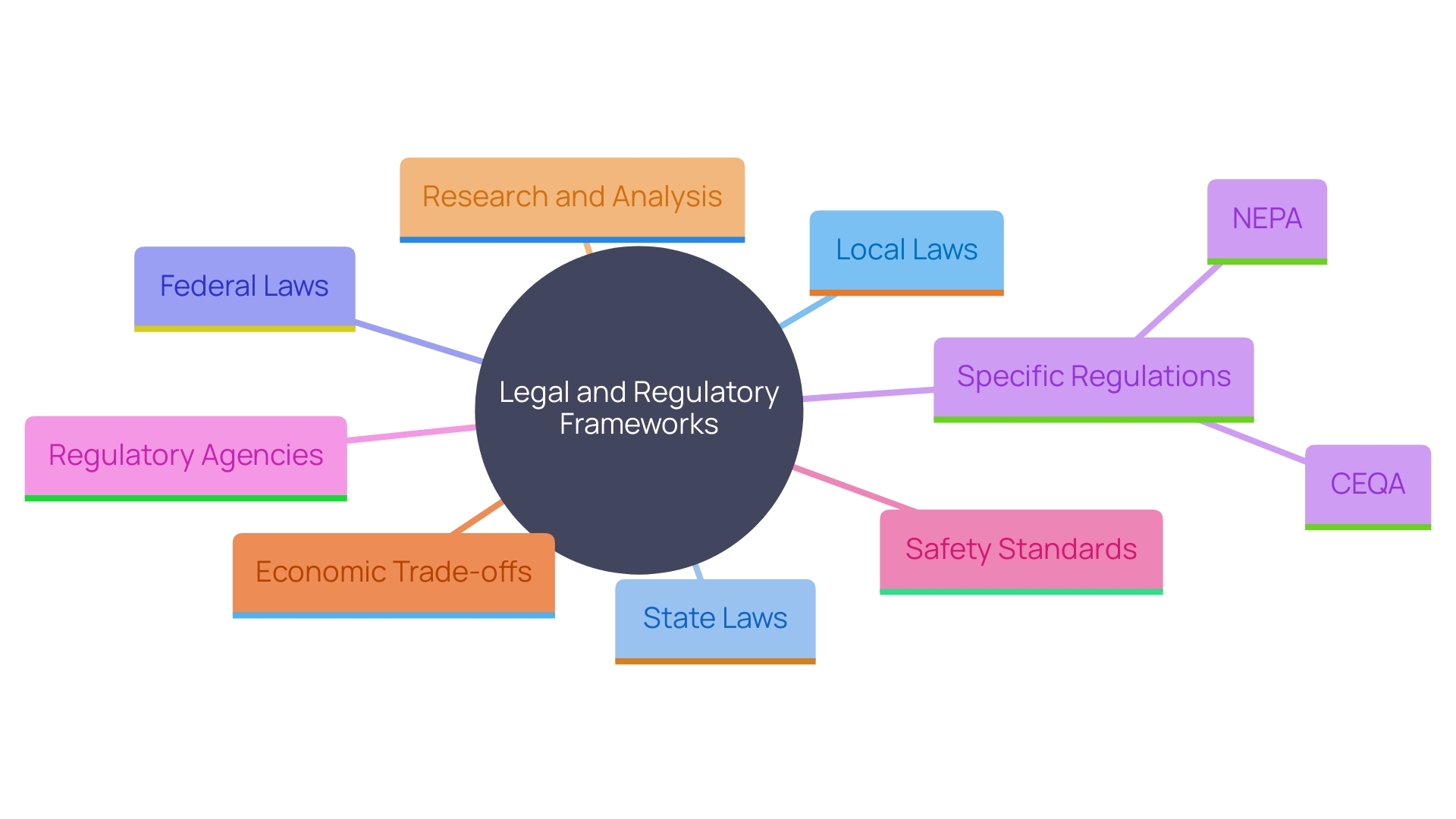Introduction
Land acquisition specialists play an indispensable role in the progression of energy and infrastructure projects, shouldering the responsibility of identifying, negotiating, and securing the necessary land and rights for development. Their duties encompass rigorous research and analysis to evaluate potential sites while considering zoning laws, land use, and environmental impacts, ensuring the feasibility and sustainability of projects. Acting as crucial intermediaries, these professionals facilitate communication among diverse stakeholders, including landowners, government entities, and developers, aligning interests to streamline the acquisition process.
In the rapidly evolving landscape of renewable energy, the International Energy Agency's Net Zero by 2050 Roadmap highlights the urgency of transitioning to sustainable energy sources. However, the expansion of renewable projects, such as wind farms, often faces local opposition due to concerns over property values and aesthetic impacts, particularly in urban areas. Land acquisition specialists must navigate these challenges by developing strategies to mitigate opposition, building consensus, and fostering trust through transparent communication.
The expertise of land acquisition specialists extends to negotiating robust agreements that balance the interests of all parties while promoting sustainable development. Their multifaceted role demands a high level of strategic planning and stakeholder engagement, pivotal to the success of energy and infrastructure projects. Ultimately, the specialists' ability to secure suitable land and comply with complex legal and regulatory requirements is crucial for advancing towards a more sustainable and resilient energy future.
The Role of Land Acquisition Specialists
'Land acquisition specialists play a crucial role in the advancement of energy and infrastructure initiatives.'. They are entrusted with the task of identifying, negotiating, and securing the necessary property and rights for development, a process that demands extensive research and analysis. Their work involves evaluating potential sites while considering zoning laws, land use, and environmental impacts to ensure the viability and sustainability of initiatives.
These professionals also act as key facilitators of communication among diverse stakeholders, including landowners, government entities, and developers. This coordination is essential to align the interests of all parties involved, ensuring a smooth acquisition process. As emphasized by Righetti, a noted authority in U.S. power legislation, effective interaction with different agencies and communities is crucial for the successful execution of major initiatives, including those involving carbon capture and storage.
The International Agency's Net Zero by 2050 Roadmap emphasizes the significance of moving to renewable power sources to address climate change. Nonetheless, the swift growth of sustainable power initiatives, such as wind farms, has resulted in increased local resistance, especially in city regions. Research indicates that wind initiatives in densely populated areas can negatively affect property values, leading to increased controversy and opposition.
Despite public support for renewable sources, the proximity of new projects to residential areas has sparked concerns over aesthetic impacts, noise, and property value depreciation. Tackling these issues necessitates property procurement experts to not only navigate intricate regulatory environments but also to create strategies for alleviating local resistance. 'Building consensus and fostering trust through transparent communication and active listening are essential skills for these professionals, as evidenced by the challenges faced in the U.S. renewable resources permitting process.'.
Case studies on negotiating extractive industry contracts in resource-rich countries reveal that governments often face disadvantages due to asymmetric information and power imbalances. In the same way, regarding the context of property procurement for power initiatives, experts need to be thoroughly prepared and armed with tactics to negotiate robust contracts that balance the interests of all stakeholders while fostering sustainable advancement.
In conclusion, the role of property procurement specialists is multifaceted and demands a high level of expertise, strategic planning, and stakeholder engagement. 'Their capacity to acquire appropriate territory and maneuver through the intricacies of legal and regulatory obligations is crucial to the success of energy and infrastructure initiatives, ultimately aiding in a more sustainable and resilient energy future.'.
Types of Land Acquisition Methods
Land procurement can be approached through various methods, each tailored to meet specific project requirements. The most common methods consist of voluntary purchase, where property owners willingly sell their assets, and eminent domain, which enables the government to require the sale of property for public use. Additionally, lease agreements, such as Master Lease Agreements, and easements like the utility easement, offer flexible solutions. A Master Lease Agreement creates a new lease while retaining the original tenant as a subtenant, often resulting in limited rights for the investor and a lower buyout value. Utility easements, especially perpetual easements, provide continuous rights to use the property without transferring ownership, offering benefits in longevity and reduced negotiation complexity. Grasping these techniques enables property procurement experts to efficiently manage legal and logistical obstacles, guaranteeing project success.

The Importance of Title Research in Land Acquisition
Title research is a crucial element of the property purchasing process, ensuring that the legal ownership of an asset is thoroughly examined. This meticulous examination confirms that the seller has the rightful authority to sell the property and that the title is free from encumbrances or disputes. By addressing potential issues such as boundary disputes or unresolved liens before they arise, accurate title research significantly reduces legal risks.
The importance of accurate title records is underscored by recent incidents involving fraudulent activities. For instance, the Kenyan Ministry of Lands highlighted the risks associated with stolen title printing papers, noting that such thefts are often aimed at producing fraudulent titles. Ms. Wahome, a key government official, emphasized that having the correct documentation is crucial in preventing fraud, as property grabbers frequently fail due to incorrect paperwork.
Moreover, the integration of advanced technologies like Artificial Intelligence (AI) is revolutionizing the title research landscape. Ai's ability to analyze vast amounts of legal documents enhances the efficiency and accuracy of title investigations, providing a robust defense against potential fraud.
The industry's commitment to maintaining secure and accurate title records is further reflected in the efforts of organizations like the American Land Title Association (ALTA). By advocating for regulatory improvements and offering education on digital closings and cybersecurity, ALTA helps professionals navigate the complexities of title research and safeguard against wire fraud and other threats.
In summary, thorough title research not only simplifies transactions but also provides reassurance to all parties involved, ensuring a smooth and secure property purchasing process.
Negotiation Strategies in Land Acquisition
Effective negotiation is fundamental in land acquisition, ensuring favorable terms for all parties involved. Specialists in this field must utilize a range of strategies to achieve optimal outcomes. Building rapport with landowners and understanding their motivations are crucial steps. Openness regarding objectives also plays a significant role in fostering trust.
One notable approach is to avoid rushing into the solution space. This idea, frequently utilized by experienced negotiators and team leaders, highlights the significance of completely grasping the issue before assessing solutions. By taking the time to thoroughly analyze the situation, land acquisition specialists can identify the most suitable strategies and create a conducive environment for negotiations.
Moreover, development agreements can be instrumental in balancing public and private benefits. 'These contracts between property owners or developers and local governments establish the rules and conditions for an undertaking, ensuring that both parties gain from the development.'. Skilled negotiators can leverage these agreements to align interests and facilitate smooth execution.
In the context of renewable energy initiatives, addressing stakeholders' concerns effectively is vital. Research highlights that opposition to such initiatives often stems from the lack of opportunities for opponents to voice their concerns and collaborate with proponents to resolve differences. By employing skilled negotiation techniques, property procurement specialists can minimize conflicts, foster positive relationships, and pave the way for successful project completion.
Legal Considerations and Regulatory Compliance
'Navigating legal and regulatory frameworks is a crucial aspect of property procurement, especially in the context of energy and infrastructure development.'. Land acquisition professionals must be adept in local, state, and federal laws that govern land use, zoning, and environmental regulations. For instance, the National Environmental Policy Act (NEPA) and state versions like California's Environmental Quality Act (CEQA) significantly impact timelines and costs for development projects, often adding years of delay and substantial compliance expenses.
Jeff Marootian, Principal Deputy Assistant Secretary for Energy Efficiency and Renewable Resources, emphasizes the importance of understanding this complex landscape to meet power needs efficiently. The Department of Energy's interactive map, which details each state's siting and permitting processes, is an invaluable tool for navigating these complexities.
Moreover, adherence to these regulations is essential to avoid legal repercussions and ensure a smooth purchasing process. The ability to anticipate regulatory challenges allows professionals to address potential issues proactively. As highlighted by Righetti, a recognized leader in U.S. energy law, engaging with regulatory agencies and understanding administrative regulations are key to successful energy development and industrial decarbonization projects.
The regulatory environment is intricate, with safety standards and economic trade-offs playing significant roles. For example, in California, safety measures for utilities often lead to higher electricity rates, impacting the general public and requiring careful consideration of reputational risks.
In-depth research and analysis into commercial market trends, like those provided by Savills, can further aid in making informed real estate decisions. Savills' global experience and expertise in real estate, spanning 700 offices worldwide, highlight the importance of leveraging technology and strategic planning to unlock real estate value and address critical challenges in land acquisition.

Conclusion
Land acquisition specialists play a vital role in energy and infrastructure projects, encompassing site identification, negotiation, and securing land rights. Their thorough research considers zoning laws and environmental impacts, ensuring project feasibility and sustainability. By facilitating communication among stakeholders, including landowners and developers, they align interests and streamline the acquisition process.
Local opposition to renewable energy projects, particularly in urban areas, presents significant challenges. Specialists must employ effective strategies, such as transparent communication and consensus-building, to address concerns over property values and aesthetics. Their negotiation skills are crucial for creating agreements that balance diverse interests while promoting sustainable development.
Moreover, rigorous title research and legal compliance are essential in the acquisition process. Accurate title investigations mitigate disputes and fraud risks, ensuring smooth transactions. As regulatory complexities increase, specialists must adeptly navigate local, state, and federal laws, anticipating challenges to facilitate energy development.
In conclusion, land acquisition specialists are key contributors to advancing energy and infrastructure projects. Their expertise in negotiation, stakeholder engagement, legal compliance, and title research is instrumental in achieving a sustainable energy future. By effectively addressing challenges and fostering collaboration, they support the realization of renewable energy goals.




